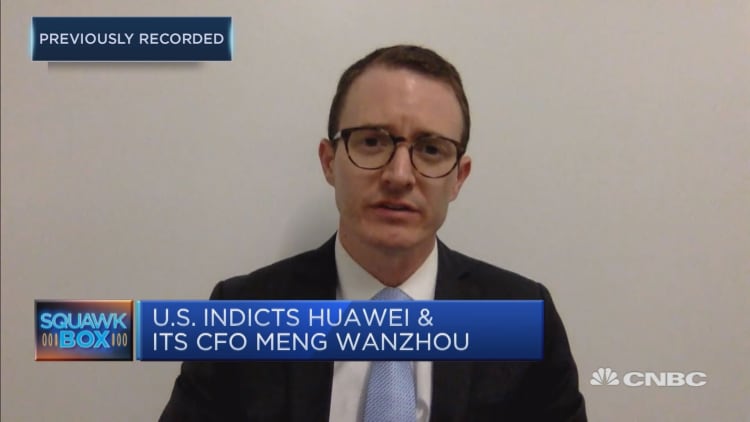
U.S. criminal charges against Huawei are not directly tied to the ongoing trade negotiations between Beijing and Washington, according to one expert who told CNBC that's not how the American legal system works.
The U.S. Department of Justice on Monday filed criminal charges against Meng Wanzhou, the chief financial officer of Huawei and the daughter of its founder and president Ren Zhengfei. The U.S. was seeking Meng's extradition from Canada, Acting Attorney General Matthew Whittaker said.
Those charges came just days before a Chinese delegation, led by Vice Premier Liu He, was set to meet with American officials to reach an agreement on tariffs before a March 1 deadline.
"I don't think that we can say that this is directly tied to the trade negotiations, in that kind of transactional way. That's just not the way the U.S. law enforcement system works, it's not the way the Justice Department works," Robert Williams, executive director at the Paul Tsai China Center in Yale Law School, told CNBC's "Squawk Box" on Tuesday.
There is no question that Huawei represents everything, all of the challenges that are facing the U.S. and China when it comes to this relationship.Alex CapriNUS Business School
Criminal investigations into Huawei began "long before" the current trade negotiations, explained Williams, who once served as a consultant to the U.S. Department of State.
"We have to step back and view this as part of a larger effort within the Justice Department, in particular, to focus on what it sees as misbehavior on the part of Chinese firms and individuals in the United States for a variety of reasons," he said.
The U.S. alleges that Meng, Huawei and a Hong Kong-based subsidiary Skycom Technologies, committed wire fraud, obscured justice, conspired to launder money and broke sanctions against Iran. The indictment also alleges that Huawei stole trade secrets from U.S. carrier T-Mobile.
'Poster child' of US-China challenges
Some analysts, however, think that Huawei's case could cast a shadow over this week's negotiations.
Huawei is a "poster child" of all the ongoing dispute between the two economic power houses, said Alex Capri, visiting senior fellow at the National University of Singapore Business School.
"There is no question that Huawei represents everything, all of the challenges that are facing the U.S. and China when it comes to this relationship," Capri told CNBC's "Street Signs" on Tuesday.
He explained that the charges provide an added incentive for Beijing to consider rolling back some of the structural sticking points in its relationship with Washington. They include intellectual property protection, forced technology transfers and subsidies provided to state-owned enterprises.
Even though Huawei is not a state-owned company, it has received a great deal of financial support from Beijing, according to Capri.
China responded to the U.S. charges against Huawei, calling it "unfair" and "immoral," Reuters reported.
Huawei, which is leading China's efforts to build the next generation of high-speed mobile internet known as 5G, is "incredibly vulnerable" and still reliant on the Western expertise to build the infrastructure needed to roll out the new technology, according to Capri. "Beijing is treading very carefully here."
Williams pointed out it's important to separate Monday's charges against Huawei from the "broader national security-related concerns with respect to Huawei's role in 5G."
The Trump administration has reportedly been pressuring U.S. allies to bar Huawei and other Chinese tech firms from building 5G infrastructure.
— CNBC's Kate Fazzini contributed to this report.


